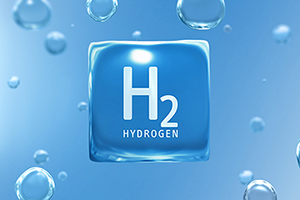Lately, there’s been a buzz over hydrogen in the media. Hydrogen-powered vehicles appear to be the next big thing after electric vehicles (EVs) inevitably run their course. Unlike EVs, they won’t require charging, nor will they depend on the energy-intensive and environmentally destructive mining of rare earths like lithium and cobalt. Upon combustion with oxygen in the air, they simply discharge clean water vapor—a miraculous energy source!
The only problems to surmount: Making hydrogen is very energy-intensive, and that energy has to be produced somewhere—windmills, solar panels, and geothermal won’t soon supplant fossil fuels as a source of electrification. And then there are memories of the Hindenburg, a hydrogen-filled airship that famously blew up. You don’t want that happening after a minor fender-bender during your daily commute on the 405!
So now there’s talk about hydrogen water. My initial impression was: “Scam Alert! This is gimmicky, another way to market expensive water—I’m already paying enough for the health aura of pricey mineral waters from branded spas.”
But I’ve come to realize there actually may be something to the concept of imbibing hydrogen, and the latest article on that subject—from no less a source than the prestigious American Journal of Clinical Nutrition—hit me with the impact of a Lakehurst, New Jersey zeppelin explosion.
First, some background. There’s a theoretical basis for believing that hydrogen, or H2, has antioxidant properties. It’s an electron donor, which, in contradistinction to oxygen (a pro-oxidant), acts as a free-radical quencher, having the ability to selectively scavenge strong oxidants such as the hydroxyl radical, a prime driver of bodily inflammation.
And, sure enough, early clinical trials are demonstrating its potential. A 2020 study in the high-impact journal Nature, entitled “Hydrogen-rich water reduces inflammatory responses and prevents apoptosis of peripheral blood cells in healthy adults: a randomized, double-blind, controlled trial”, concludes that consumers of 1.5 liters of hydrogen water per day showed significantly lower expression levels of inflammatory markers. It was especially helpful in promoting biological antioxidant capacity in older adults—precisely those more prone to “inflamm-aging”.
Moreover they write: “Recently, the US Food and Drug Administration acknowledged hydrogen (H2) gas as food additives when used in drinking water or beverages and declared them to be generally recognized as safe.”
In the November AJCN study, the authors note in their preface:
“ . . . drinking hydrogen water improved cognition in subjects with mild cognitive impairment having a specific genotype of apoE4 carriers. Further, inhalation of hydrogen gas was therapeutic for patients with potential metabolic syndrome and hypercholesterolemia, cerebral and cardiac infarction, post–cardiac arrest syndrome, and ethanol-induced fatty liver.”
So—and this may seem frivolous, but it illustrates the potential power of hydrogen therapy—they attempted to demonstrate that hydrogen administration before and after an alcohol challenge would reduce hangover symptoms!
And, Spoiler Alert—it did! In the experimental setup, they had volunteers inhale hydrogen-enriched air, then drink a wallop of pure ethanol (100 ml—the equivalent of six 1.5 ounce shots of vodka or gin). Immediately afterward, they drank hydrogen water and their alcohol levels were measured, reflecting how quickly their bodies eliminated it. Their subjective hangover symptoms—headache, brain-fog, etc.—were also meticulously recorded.
The results were astounding: Blood alcohol levels declined more rapidly in the hydrogen-exposed group, reflecting enhanced detoxification; fewer hangover symptoms were reported after hydrogen, and the cognitive scores of those who underwent hydrogen treatment reflected better attention and cognitive functions.
Admittedly, significant improvements in breath alcohol were seen only in males, not females, although both sexes reported fewer hangover symptoms after hydrogen. This may be explained by the fact that women, generally, have weaker detox pathways for alcohol elimination, due to their smaller size and the competitive effects of estrogen on liver xenobiotic metabolism. Hydrogen had a less protective effect on women subjects (maybe it would have if they’d given them less alcohol than the men got).
One of the problems with this study is that, while it demonstrated the efficacy of hydrogen for hangovers, it didn’t differentiate between hydrogen inhalation and hydrogen water—the experimental group got both. So the practical impact is that bar owners won’t yet be able to decide whether to install gas bars with hookah pipes for pre-drink H2 inhalation, or offer hydrogen water chasers for their patrons! (Seriously, circle back with me in a couple of years on this!)
A proviso is that we know that alcohol consumption has virtually no redeeming health value, even in moderate amounts, much less enough to induce hangovers. The latest studies highlight its negative impact on a wide spectrum of cancers, on neurological health, and its cardiovascular benefits have been vastly oversold. Giving binge-drinkers hydrogen is a little like putting filters on “low-tar” cigarettes, and may even have unintended consequences—like giving people license to consume more booze with seeming impunity.
Even the AJCN study authors somewhat sheepishly concede:
“It needs to be explained that, in a public health view, it seems like a better idea to avoid binge-drinking instead of having to inhale or drink hydrogen gas/water before or during the alcohol intake.”
But as a proof of principle, the research is intriguing. If hydrogen has such a profound effect on detoxifying alcohol, might it not find a wide variety of more serious clinical applications? Could it provide a means of detoxifying from the effects of ubiquitous environmental pollutants? As a “rescue” treatment after harsh chemo or radiation? For the myriad of diseases that involve inflammatory pathways that hydrogen is now shown to quench? To aid recovery from strenuous workouts? Or as a general purpose anti-aging elixir?
I can even envision the potential for rectal administration of hydrogen gas or enriched water for intestinal ailments like colitis (It’s already been found effective in a mouse model of colitis when the animals drank hydrogen water).
More has to be determined in terms of delivery method (inhaled gas vs. hydrogen-infused water) and precise dosing (schedules and concentration); is it possible that H2 will synergize with some of our more tried and true antioxidants like vitamin C or glutathione? Future research will seek answers.
I’m no expert on hydrogen water, but there are a wide array of consumer options as the hydrogen Gold Rush inevitably begins. According to a review in Natural Medicine Journal:
“Individual cans or bottles range from $2.50 to $3.00 each versus about $0.60/bottle of spring water.” But to get the full benefits of hydrogen water seen in most studies, they say, you’d have to drink six 8 oz. bottles which could add up to around $15 per day. “Hydrogen water tablets and machines are also available, which may cut down on the cost somewhat.”
Top-rated kitchen counter hydrogen water generators range in price from a few hundred dollars to over $5000, which means it’ll take a while to amortize the outlay. Factor in the cost of electricity to power these gadgets. Don’t ask me to rate their price-worthiness or reliability, because I have no idea. It appears these products come and go with great rapidity, but with demand sure to increase, innovative companies are sure to step up.
BOTTOM LINE: Hydrogen administration is a serious health modality whose full potential will only be revealed by future research. Intelligent Medicine is sure to keep you abreast of this emerging story.








